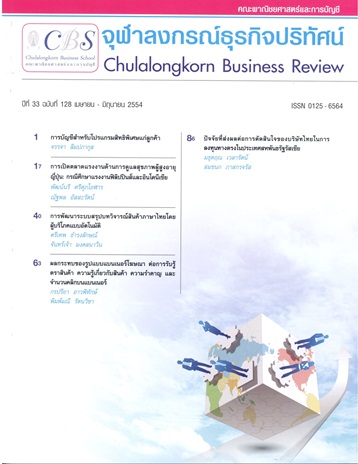ปัจจัยที่ส่งผลต่อการตัดสินใจของบริษัทไทยในการลงทุนทางตรงในประเทศสหพันธรัฐรัสเซีย
Main Article Content
Abstract
บทคัดย่อ
การศึกษานี้มีวัตถุประสงค์ในการศึกษาปัจจัยที่ส่งผลต่อการตัดสินใจของบริษัทไทยในการลงทุนทางตรงในประเทศสหพันธรัฐรัสเซีย (เรียกโดยย่อว่ารัสเซีย) และศึกษาถึงรูปแบบการลงทุนของบริษัทไทยในรัสเซียและสาเหตุของการเลือกรูปแบบดังกล่าว โดยใช้วิธีการเก็บข้อมูลด้วยการสัมภาษณ์เชิงลึกจากผู้บริหารบริษัทผลิตอาหารสัตว์และเลี้ยงสุกร บริษัทผลิตเครื่องสำอาง และนักธุรกิจไทยที่กำลังจะเปิดร้านอาหารไทย ณ กรุงมอสโก และจากเอกสาร หลักฐาน และการสัมภาษณ์เพิ่มเติมจากหน่วยงานที่เกี่ยวข้อง พบว่าการลงทุนของบริษัทไทยในรัสเซียสอดคล้องกับทฤษฎีการลงทุนทางตรงต่างประเทศอย่างสมบูรณ์ (Eclectic Paradigm หรือที่นิยมเรียกว่า OLI Paradigm) ของจอห์น เอช ดันนิ่ง (John H. Dunning) ที่กล่าวว่าปัจจัยที่ทำให้เกิดการลงทุนทางตรงต่างประเทศเกิดจากข้อได้เปรียบจากการเป็นเจ้าของสินทรัพย์บางประการ ข้อได้เปรียบจากแหล่งที่ตั้ง และข้อได้เปรียบจากการทำภายในบริษัทเอง เหตุผลหลักในการไปลงทุนของธุรกิจไทยในรัสเซียมีดังนี้ 1) เพื่อใช้ประโยชน์จากการมีความได้เปรียบเฉพาะในด้านเทคโนโลยีและความชำนาญด้านการผลิต การจัดการ 2) เพื่อใช้ประโยชน์จากขนาดหรือศักยภาพของตลาด 3) เพื่อใช้ประโยชน์จากแหล่งวัตถุดิบอันเป็นปัจจัยการผลิต 4) เพื่อลดระยะเวลาและค่าใช้จ่ายในการขนส่ง 5) เพื่อสร้างกลยุทธ์ความได้เปรียบคู่แข่งด้านราคา และ 6) เพื่อหลีกเลี่ยงการรั่วไหลของความรู้ที่เป็นข้อได้เปรียบสำคัญของบริษัท ทั้งนี้สาเหตุในการลงทุนส่วนใหญ่คือเพื่อเป็นการแสวงหาตลาด ซึ่งพบว่ามีการเลือกรูปแบบการเป็นเจ้าของเองทั้งหมดในบริษัทที่มีการผลิต เพื่อคงอำนาจในการตัดสินใจและการควบคุม และการเลือกรูปแบบการลงทุนร่วมในธุรกิจบริการเพื่อใช้ประโยชน์จากความสามารถของหุ้นส่วน การศึกษาครั้งนี้ได้ใช้ Linkage - Leverage-Learning Model (LLL Model) ของจอห์น เอ แม็ททิว (John A. Mathew) วิเคราะห์การลงทุนดังกล่าวพบว่าในกรณีของร้านอาหารไทยนั้นสามารถอธิบายด้วย LLL Model ได้ชัดเจนกว่า OLI Paradigm
คำสำคัญ : การลงทุนทางตรง รัสเซีย
Abstract
The objective of this project is to study factors affecting Thai companies’ decisions for foreign direct investment (FDI) in Russian Federation (abbreviated as Russia), entry modes and their reasons for choosing these modes. The primary data were collected by in-depth interviews from the executives of a feed mill & a pig farm company, and a cosmetics manufacturer who already have FDI in Russia. An entrepreneur who plans to open a Thai restaurant in Moscow was also interviewed. Further information was collected from the official documents and interviews of FDI-related organizations. The findings showed that FDI in Russia from Thai companies could be well explained by John H. Dunnings’s Eclectic Paradigm (or OLI Paradigm) that FDI occurs when a firm has Ownership Advantages (O), Location Specific Advantages (L), and Internalization Advantages (I). The main reasons of the investments were as follows: 1) to take advantage of operational technology and managerial skills, 2) to take advantage of size or potential of the market, 3) to take advantage of sources of raw materials (also referred to as a factor of production), 4) to reduce lead time and logistics cost, 5) to develop a competitive strategy to take advantage of price, and 6) to avoid the leak of competitive knowledge. The most often cited reasons were market-seeking. Wholly-owned subsidiaries were chosen as an entry mode by manufacturing companies in order to maintain the power of decision making and controlling. A joint venture mode was chosen by service business for a benefit from partner skills. It was found that Linkage-Leverage-Learning Model (LLL Model) by John A. Mathew could be used to explain a Thai restaurant case more clearly than OLI Paradigm.
Keywords : Foreign direct investment, RussiaArticle Details
Opinions and discussions in papers published by the Creative Business and Sustainability Journal (CBSJ) are deemed as personal opinions and the responsibility of the writers. They are not the opinions or responsibility of the Chulalongkorn Business School of Chulalongkorn University.
Papers, content, information etc. appearing in the Journal are deemed to be the copyright property of the Chulalongkorn Business School of Chulalongkorn University. Anybody or any organization that wishes to publish any part of them or use them in any way must obtain written permission from the Chulalongkorn Business School, Chulalongkorn University.


